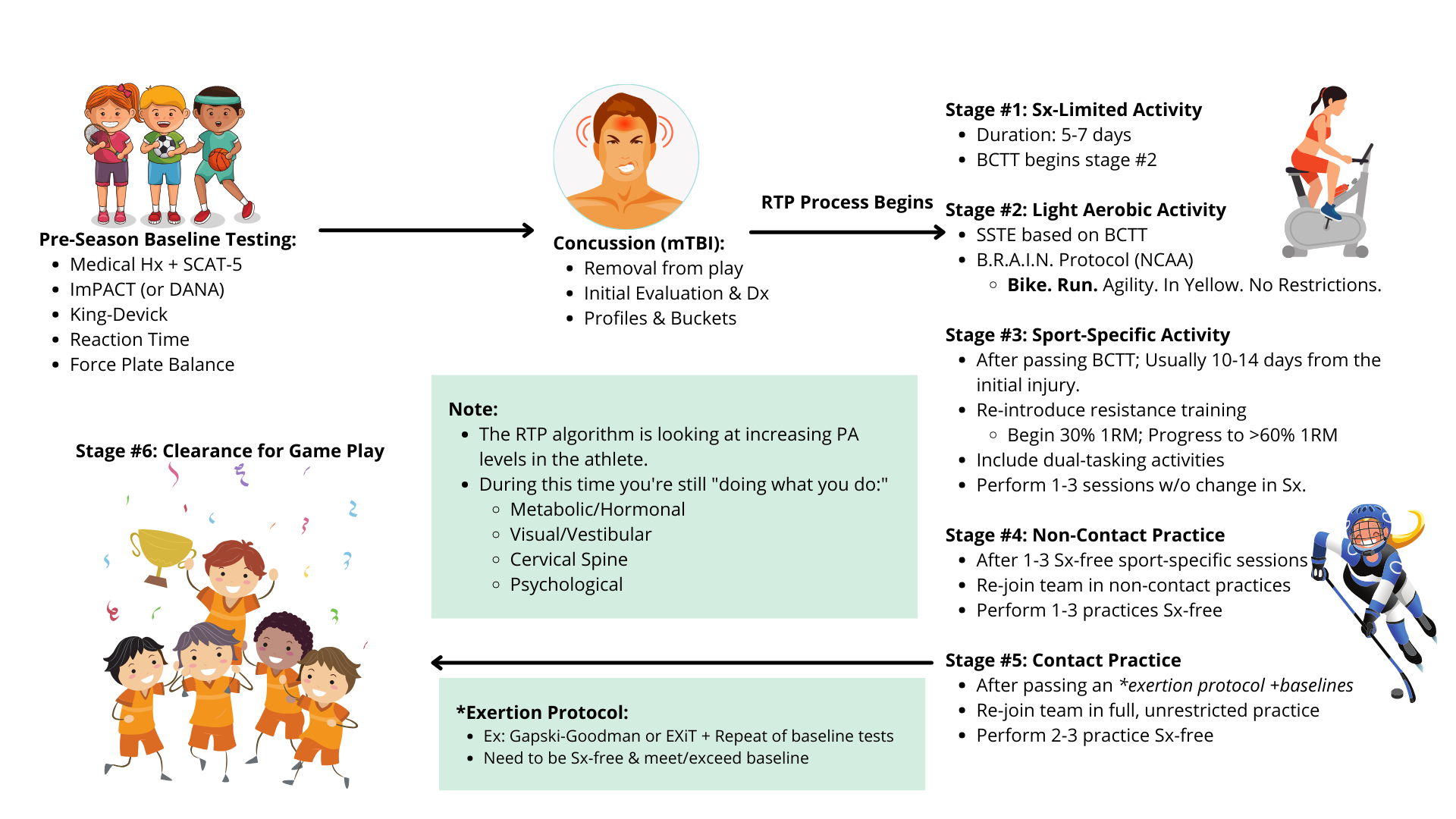The REAL Timeline for Concussion Recovery: What to Expect
Concussion recovery isn’t as simple as waiting for symptoms to disappear. If you’re an athlete, coach, or parent navigating return-to-play decisions, you need to understand what’s really happening under the hood—because symptom resolution doesn’t mean complete recovery.
I’m Dr. Mark, a concussion specialist who works with athletes, parents, and high performers to ensure safe, evidence-based concussion recovery. If you feel stuck in recovery or hear conflicting advice, let’s clear the noise and set realistic expectations.
How Long Does Concussion Recovery Actually Take?
The good news: most people recover within 3-4 weeks. That’s about the same timeframe as an ankle sprain.
A key study found that:
45% of athletes recover within two weeks
32% recover by four weeks
17% take 4-8 weeks
Only 5-7% take longer than eight weeks
This means 70-80% of concussed individuals recover within a month—but here’s the catch: these numbers assume active rehab. You may not recover within that timeframe if you’re resting and waiting.
Slide from my 2024 presentation at the Sonoran University of Health Sciences (SUHS).
Why Strict Rest Is Outdated (And What To Do Instead)
The old advice of "rest until symptoms disappear" is not only outdated—it can actually make recovery worse.
Strict rest beyond the first 24-48 hours can prolong symptoms.
Complete inactivity deconditions your nervous system, making it harder to return to play.
Athletes who receive early rehab recover faster and are less likely to develop prolonged symptoms.
Instead, a modern approach includes:
✔ Gradual reintroduction of activity (starting with light aerobic exercise)
✔ Symptom-limited exertion protocols to guide return to play
✔ Active rehab addressing vision, balance, neck function, and autonomic regulation
Slide from my 2022 presentation at the Advanced Applications in Medical Practice (AAMP) Conference. Updated presentation in 2025 for SUHS.
Why Do Some Athletes Take Longer to Heal?
Not all concussions are the same. Recovery depends on which systems are affected.
The 5 Major Symptom Generators in Concussion Recovery:
1. Autonomic Dysfunction
Common in athletes with exertion intolerance, dizziness, or headaches.
Testing: Buffalo Concussion Treadmill Test (BCTT) or Buffalo Concussion Bike Test.
Rehab Focus: Subsymptom aerobic training to restore blood flow regulation.
2. Metabolic & Hormonal Dysregulation
Concussions disrupt brain energy metabolism, leading to fatigue, brain fog, and mood changes.
Nutrition and strategic supplementation (like omega-3s, creatine, and magnesium) can support brain recovery.
3. Visual-Vestibular Dysfunction
Blurred vision, dizziness, and difficulty tracking moving objects = signs of visual or vestibular dysfunction.
Screening: Vestibular-Ocular Motor Screening (VOMS).
Rehab: Targeted vision therapy, vestibular rehab, and balance training.
4. Cervical Spine Dysfunction
Neck injuries often go undiagnosed in concussion cases.
Symptoms overlap with concussion: headaches, dizziness, neck pain, and visual issues.
Rehab: Manual therapy, mobility work, and neck strengthening.
5. Psychological Factors
Fear, stress, and anxiety can slow recovery.
Many athletes feel hesitant to return to contact sports after injury.
Addressing psychological readiness is just as crucial as physical rehab.
Key Strategies for a Faster Recovery
1. Early Aerobic Exercise
Light movement as early as 48-72 hours post-injury improves recovery.
Use exertion testing (BCTT) to set safe exercise thresholds.
2. Nutrition & Supplementation
Fuel brain recovery with quality protein, healthy fats, and micronutrients.
Consider science-backed supplements like omega-3s, magnesium, and creatine.
Find NSF-certified supplements here (patients get 20% off).
3. Vision & Vestibular Rehab
Vision therapy and vestibular rehab are essential if dizziness, balance issues, or visual tracking problems persist.
4. Cervical Spine Therapy
A concussion specialist should screen for neck dysfunction—manual therapy and targeted strengthening can be game-changers.
5. Psychological Readiness & Mental Resilience
Addressing fear and anxiety around return to play is critical.
Mental training, visualization, and graded exposure to gameplay help rebuild confidence.
When Should You Seek Expert Help?
If your symptoms last longer than 3-4 weeks or you struggle with:
Lingering dizziness, brain fog, or headaches
Exercise intolerance
Unresolved vision or balance issues
Feeling “off” even after symptoms fade
➡ It’s time to work with a concussion specialist.
Final Thoughts: Why “Symptom-Free” Doesn’t Mean Fully Healed
Just because symptoms fade doesn’t mean full brain recovery has occurred. Returning to play too early doubles the risk of another injury—often an orthopedic injury due to lingering deficits in reaction time, balance, and motor control.
If you want to return to sport safely, follow a structured rehab plan.
Image from my 2022 presentation at AAMP.
Want Expert Guidance on Your Recovery?
If you’re serious about returning to sport safely and not just waiting for symptoms to disappear, let’s build a plan that works.
🔹 Book a Concussion Recovery Consultation to get a personalized RTP strategy.
🔹 Shop vetted, NSF-certified supplements here (10% off for all orders, 20% off for patients).
🔹 P.S. Learn how to choose quality supplements in this blog. Instead of blindly trusting your aunt on WhatsApp or the influencer on TikTok.
TL;DR (Too Long; Didn’t Read)
✔ 70-80% recover within 3-4 weeks (with active rehab).
✔ Strict rest delays recovery—early movement matters.
✔ 5 symptom generators dictate recovery speed (not just time).
✔ Exertion testing, vision therapy, and cervical rehab are game-changers.
✔ Symptom-free doesn’t mean fully healed—structured rehab is key.
🔹 Want to get back in the game safely? Book an RTP consultation now.


